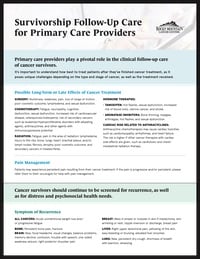Benefits of Referring Patients to RMCC
Our team is composed of physicians, advanced practice providers, nurses and other professionals who specialize in medical oncology, hematology, gynecologic oncology, radiation oncology, surgical oncology, and palliative care. We work collaboratively with each other and with you to provide high quality, evidence-based care.
What Makes Rocky Mountain Cancer Centers the Preferred Choice in Colorado?
Since 1992, Rocky Mountain Cancer Centers has defined the standard of cancer treatment, treating more adult cancer patients than any other organization in Colorado.
Today, Rocky Mountain Cancer Centers (RMCC) is the largest multidisciplinary practice on the Colorado Front Range dedicated solely to providing state-of-the-art care for patients with cancer and diseases of the blood.
Our independent, community-based model of cancer care means that patient-centered, evidence-based treatment is always close to home.
We are an independent, physician-owned practice.
This means that we have the freedom to make the care decisions that benefit our patients and their families – not health systems.
We offer unmatched experience, expertise, and access.
- RMCC providers have a combined 150+ years of experience.
- There are more than 500 clinical trials available to your patients.
- We provide our physicians’ cell phone numbers to referring providers so that you can easily reach us by phone with any questions or urgent cases.
We uphold a lower cost of care.
We are committed to providing unmatched quality care while keeping patients’ cancer costs low. We achieve this through our participation in the Center for Medicare and Medicaid’s Oncology Care Model. For every dollar spent in the office of an independent oncologist, it’s estimated by the federal government the spend will be $1.80 with an oncologist employed by a hospital system. It doesn’t mean you receive lesser care at RMCC. It means patients receive the very best care that happens to be at a better price. We decrease the total cost of cancer care by:
- Utilizing fiscally responsible drug strategies.
- We have our own pharmacy with staff that specializes in oral oncolytics.
- We offer diagnostic imaging services.
- Utilizing Navigating Care; a remote symptom, side-effect, and medication management system.
- As a member of The US Oncology Network, our physicians maintain their independence, but get the support of a management company that has deep expertise in oncology practice management and value-based care delivery.
We provide increased patient care quality.
- Communicating and coordinating care with all providers.
- Measuring patient satisfaction and creating ongoing strategies to improve the patient experience.
- Providing pain assessment and management.
- Offering additional patient support services (financial, clinical, nutrition, weight loss, smoking cessation).
We utilize treatment pathways for the most successful outcomes.
Value Pathways powered by NCCN™ (National Comprehensive Cancer Network) are treatment pathways that highlight evidence-based treatment options based on efficacy, toxicity and an evaluation of financial impact to patient and payer (Medicare reimbursement). The pathways are a refinement of the NCCN Guidelines and the result of combined efforts through a collaboration between three organizations: NCCN, McKesson and The US Oncology Network. Value Pathways powered by NCCN is a shorter, distilled list of treatment choices that support the delivery of high-quality, cost-effective patient care.

Consistently High Patient Satisfaction
RMCC implements a widely used methodology known as the Net Promoter Score, which allows for the real-time evaluation of service quality and patient satisfaction. By industry standards, a score of 75 percent or above is considered high. Consistently scoring above 80 percent, RMCC ranks among the highest recorded in any industry.
Clinical Excellence With a Personal Touch
At RMCC, our search for new treatments is relentless. Our drive to provide superior care runs deep. And our fight against cancer is personal. Our independent, physician-led practice is known for delivering clinical excellence combined with unmatched personal and emotional support in neighborhoods through the front range.
Our Approach to Caring for Your Patients
At its heart, our approach to cancer care is simple - to surround our patients with everything they need so they can focus on what matters most: beating cancer.
At RMCC, we offer:
- Renowned experts aggressively attack cancer with every possible strategy.
- Our nationally recognized clinical trials team is located here on the front range and engaged in a passionate search for innovative treatments.
- A team of professionals that helps patients and their families manage the day-to-day challenges that come with a diagnosis.
Clinical Services Offered in Colorado
Medical Oncology Treatments
Surgical Oncology
Hematologic Treatment Specialties
Special Expertise
Innovative Clinical Trials
Clinical Research Trials available to patients to evaluate new treatments and combinations of treatments.
Imaging
Diagnostic Imaging Services includes CT and PET/CT scanners in many clinics and our Mobile PET/CT Coach.
Pathology and Lab Services
On-Site Laboratories providing rapid turnaround for many tests including:
- Complete Blood Count (CBC)
- Chemistry Tests
- Clotting Tests
- Tumor Markers
Integrated and Support Services
- Advance Care Planning
- Financial Counselors
- Genetic Testing
- Nursing Triage
- OCM Navigators
- Social Workers
- Support Groups
Oral Pharmacy
Medically-Integrated Dispensing Pharmacy ready to fill oncolytic and supportive care prescriptions with a dedicated team.
Survivorship Follow-Up Care for Primary Care Providers
It’s important to understand how best to treat patients after they’ve finished cancer treatment, as it poses unique challenges depending on the type and stage of cancer, as well as the treatment received.

Helpful Information for Referring Providers
-
Hematology Work-Up Refresher
-
Radiotherapy Updates for Oligometastases
-
Men's Oncology Health
-
Women's Health Oncology & Hematology
-
Managing the Side Effects of Your Patients on Active Cancer Treatment
-
The Transformational Year in Gastrointestinal Cancers
-
Breast Cancer Updates for the Primary Care Provider
-
Hematology Updates for the Primary Care Provider
-
Lung Cancer Screening, Diagnosis and Treatment for the Primary Care Provider
-
Colorectal Cancer Updates 2023
-
ASH Updates 2022
-
ASH Updates 2022
-
New Radiation Oncology Technologies for Diagnosis & Treatment of Common Cancers
-
ASH Updates 2021
-
Lung Cancer Update - Precision Medicine
-
Cancer Screening and Cancer Prevention
-
Genetic Risk Evaluation and Testing (GREAT) High Risk Program
-
RMCC Lymphedema Prevention Program
-
The Latest News in Colorectal Cancer
-
Hypofractionated Radiation
-
Understanding Your Breast Cancer Pathology Report
-
Genomic Assays and Breast Cancer
-
Metastatic Prostate Cancer Research Updates
-
Adjuvant Endocrine Therapy for Breast Cancer
-
Advances in the Treatment of Non-Hodgkin Lymphoma
-
Introduction to Chronic Lymphocytic Leukemia
-
Prostate Cancer Radiation Explanations to Support Informed Decisions
-
Metastatic Hormone Positive Breast Cancer
-
Topics in Breast Cancer Surgery
-
ASH Updates 2020: Lymphoma and CLL
-
ASCO Updates 2020: Colon Cancer
-
ASCO Updates 2020: Bladder Cancer
-
ASCO Updates 2020: Blood Cancers
-
ASCO Updates 2020: Breast Cancer
-
ASCO Updates 2020: Lung Cancer
Cancer Screening Guidelines
Female Breast Cancer
Age 40 to 74: Patient should be screened with an annual mammogram.
Age 75 and over: Patients should continue with mammograms if their overall health is good, and they have a life expectancy of 10 or more years.
The American Cancer Society recommends against MRI screening for women whose lifetime risk of breast cancer is less than 15%.
High Risk: Women who are at high risk for breast cancer should get a breast MRI and a mammogram annually, typically starting 10 years prior to the earliest breast cancer diagnosis in the family.
Risk factors include:
- A lifetime risk of breast cancer of about 20% or greater, according to risk assessment tools that are based mainly on family history (e.g., Tyrer Cuzick)
- A known BRCA1 or BRCA2 gene mutation (based on having had genetic testing) or other genetic predisposition for breast cancer
- A first-degree relative (parent, brother, sister, or child) with BRCA1 or BRCA2 gene mutation, but patient has not had genetic testing themselves
- Previous radiation therapy to the chest when they were between the ages of 10 and 30 years
Colorectal Cancer Screening
Age 21: Testing may be recommended for patients with a higher-than-average risk for colon cancer.
Age 45 to 75: People at average risk (in good health and with a life expectancy of more than 10 years) should have regular colorectal cancer screenings.
Age 76 to 85: The decision to be screened should be based on patient preference, life expectancy, overall health, and prior screening history.
Age 86 and over: Colorectal cancer screenings are no longer required.
High Risk: People who are at an increased or high risk for colorectal cancer might need to start screening before age 45, be screened more often, and/or get specific tests.
Risk factors include:
- A personal history or a strong family history of colorectal cancer or certain types of polyps
- A personal history of inflammatory bowel disease (ulcerative colitis or Crohn’s disease)
- A known family history of a hereditary colorectal cancer syndrome such as familial adenomatous polyposis (FAP) or Lynch syndrome (also known as hereditary non-polyposis colon cancer or HNPCC)
- A personal history of radiation to the abdomen (belly) or pelvic area to re-treat a prior cancer
Stool-Based Tests
- Highly sensitive fecal immunochemical test (FIT) every year
- Highly sensitive guaiac-based fecal occult blood test (gFOBT) every year
- Multitarget stool DNA test (mt-sDNA) every three years
Visual (Structural) Exams of the Colon and Rectum
- Colonoscopy every 10 years for average risk; more frequently based on personal and family history or if pathology is identified
- CT colonography (virtual colonoscopy) every five years; more frequently if pathology identified
- Flexible sigmoidoscopy (FSIG) every five years; more frequently if pathology identified
Lung Cancer Screening
Age 50 to 80: An annual lung cancer screening with a low-dose CT scan is recommended for patients who:
- Are in fairly good health
- Are a current or former smoker
- Have at least a 20 pack-year smoking history
Prostate Cancer Screening
Age 40 to 49: No screening needed unless high risk.
Age 50 to 69: Screening with prostate-specific antigen (PSA) test should be considered for average-risk patients. The decision to screen with a PSA should be based on patient preference, family history, and current health.
Age 70 and over OR any man with less than 10 to 15 years life expectancy Screenings are no longer required.
High Risk: Screening with a PSA should be considered for high-risk populations and African Americans with a positive family history starting at age 40.
Risk factors include:
- Men with a first-degree relative (father or brother) who had prostate cancer at an early age (younger than age 65)
- Men with a genetic predisposition for prostate cancer (BRCA1/2 positive or other genes)
Cervical Cancer Screening
Younger than 21: No screening needed.
Age 21 to 29: Cytology (PAP) once every three years.
Age 30 to 65: Women should have an HPV test every five years, a PAP every three years, or HPV/PAP co-test every five years.
Age 65 and Older: No screening needed if a series of prior tests were normal.
Pancreatic Cancer Screening
High Risk: Patients who are considered high risk should have an MRI/MRCP and/or endoscopic ultrasound annually, starting at age 50 (or 10 years prior to the earliest diagnosis in the family).
Risk factors include:
- Certain gene mutations such as ATM, BRCA1, BRCA2, PALB2 mutation, and others
- Family history of pancreatic cancer in two or more first-degree relatives
- Family history of pancreatic cancer in three or more first and/or second-degree relatives


